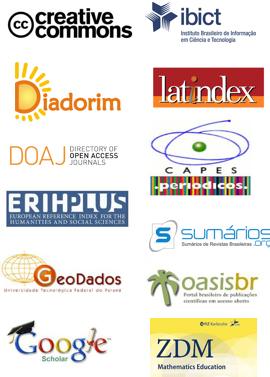Modelagem Matemática e Aprendizagem Significativa: uma Relação Subjacente
DOI:
https://doi.org/10.17921/2176-5634.2021v14n2p241-247Resumo
Resumo
O presente artigo propõe-se a apresentar algumas reflexões, embasadas em uma pesquisa bibliográfica, sobre a modelagem matemática como metodologia de ensino. Discutem-se os pressupostos, as características, as etapas e as possibilidades de organização curricular de atividades que são pautadas nessa alternativa metodológica. Destaca-se o papel da teoria da aprendizagem significativa na fundamentação e na defesa da modelagem matemática como proposta de ensino. Efetua-se um confronto das várias perspectivas oriundas dos textos científicos selecionados para estudo e análise, de modo a buscar convergências que evidenciem o potencial da modelagem matemática para: (1) favorecer a utilização pedagógica dos conhecimentos prévios dos aprendizes e (2) instigar o comprometimento deles com as situações de aprendizagem. Conclui-se o trabalho apresentando argumentos que caracterizam essa metodologia de ensino como favorecedora da aprendizagem significativa de conteúdos matemáticos, com o intuito de disponibilizar aos professores de matemática subsídios teóricos que os auxiliem na tomada de consciência do processo de interação cognitiva, entre as novas informações e os conhecimentos prévios do educando, subjacente às atividades de modelagem matemática.
Palavras-chave: Modelagem Matemática. Aprendizagem Significativa. Educação Matemática.
Abstract
This article presents some reflections based on a bibliographic research on mathematical modeling as a teaching methodology. The assumptions, characteristics, stages, and possibilities of curricular organization of activities based on this methodological alternative are discussed. The role of significant learning theory in the foundation and defense of mathematical modeling as a teaching proposal is highlighted. A comparison of the various perspectives from the scientific texts selected for study and analysis is made to find convergences that highlight the potential of mathematical modeling to: (1) favor the pedagogical use of the students' prior knowledge and (2) instigate their commitment to learning situations. The work is concluded with arguments that characterize this teaching methodology as fostering significant learning of mathematical content, to provide mathematics teachers with theoretical subsidies that help them to become aware of the cognitive interaction process, among the new information and the students' previous knowledge that underlies the mathematical modeling activities.
Keywords: Mathematical Modeling. Meaningful Learning. Mathematics Education.


